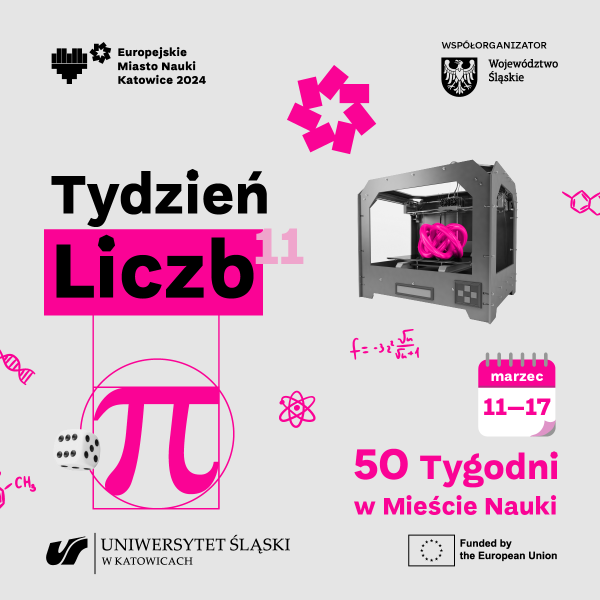| Anna Glenszczyk, PhD, curator of Numbers Week |
Numbers Week began with an exhibition of images generated by artificial intelligence at the Scientific Information Center and the Academic Library, accompanied by a lecture entitled “Evolutionary Art” given by prof. Urszula Boryczka. The lecture presented both the history of marriage of art and computer techniques, as well as issues related to the usefulness of art and its use in mass culture and the decorative aspects of everyday objects. During the discussion after the lecture, the issue of authorship of works that use artificial intelligence tools and the autonomy of this type of processes in relation to the creator was raised.
Cybersecurity matters were raised many times throughout the week. At Monday’s workshops for young people and students ‘Man in the spotlight of cybercriminals’, specialists from PKO Bank Polski showed how easy it is for fraudsters to impersonate someone, how to defend against this type of activities and how to increase awareness of such threats. Przemysław Kudłacik, PhD, Eng., talked about more advanced issues regarding digital security during the online workshop ‘From cryptography to cryptocurrencies, or how a digital record can have value’. He placed emphasis on raising awareness of the reliability of modern cryptographic techniques used in IT and financial systems and the unreliability of the “human factor”, which is currently the most common cause of security breaches.
Financial aspects were discussed both in the context of online banking security and specific investment and accounting methods. In the discussion ‘From rags to riches, or why ‘nothing’ has value’, Przemysław Kudłacik, PhD Eng. and Piotr Dąbrowski, PhD looked closer at both practical methods of investing in cryptocurrencies and the problem on the border of finance and philosophy regarding value in the context of digital currencies. Practical applications of accounting were presented in a lecture combined with workshops conducted by Maciej Tuszkiewicz, MSc, entitled ‘Numbers around the Business World: Introduction to Accounting’, during which participants expanded their knowledge of accounting through exercises in classifying items in the balance sheet and profit and loss account. This topic was also discussed on the voivodeship macro scale by specialists from the Statistical Office in Katowice, who gave a lecture entitled ‘Finance? And where does this come from?’ during which they explained to the youth what are the rules for obtaining and spending funds by local government units and what is GDP and what is the share of voivodeships in its creation.
One of the main goals of Number Week was to show the ubiquity and usefulness of numbers in various aspects of life. In the lecture ‘The organism in numbers’ prof. Armand Cholewka cited numerical data about the human body and pointed out how even minor irregularities in the arrangement, nutrition and use of the body can affect health. Numbers in sports were discussed in the lecture ‘Infinity and multidimensional modeling in sports’ by Grzegorz Mikrut, PhD and Robert Roczniok, PhD, DSc Eng., Assoc. Prof.; and ‘About numbers in music’ – a mini-lecture combined with an artistic performance prepared on Sunday afternoon by the Student Song and Dance Ensemble ‘Katowice’.
Cooperation with the Jerzy Kukuczka Academy of Physical Education in Katowice as part of Numbers Week also resulted in the organization of the ‘Pi Run’, which took place at the Academy’s stadium. More than two hundred people took part in the race, including several dozen preschool children who ran a distance of 314 meters, and several dozen school-age children who ran, depending on the age group, a distance of 200, 300 or 500 meters multiplied by pi. Adults constituted the largest group of participants and competed over a distance of 3,140 meters. The race was accompanied by scientific demonstrations on materials engineering, and a fitness instructor, who conducted a warm-up for a given age group before each start, ensured integration and good preparation of the participants.
The two key scientific moments of Numbers Week were a seminar for PhD students and researchers on the applications of logic in theoretical computer science, held by Tadeusz Litak, PhD, DSc, entitled ‘The Coq proof assistant in research and in teaching: a personal perspective’ and chemical workshops for youth “Oscillations 2.0”, which took place in a hybrid form with the participation of scientists from the University of Łódź and the Wrocław University of Technology.
The Week of Numbers also included Pi Day, which is a cyclical event popularizing exact sciences that has been taking place for eighteen years at the USil Faculty of Science and Technology. Incorporating this event into the celebration of the European City of Science Katowice 2024 allowed us to reach a wide group of young recipients with the offer of workshops and lectures in mathematics, physics, chemistry and computer science. Due to the changing economic panorama of the region and plans for the development of Upper Silesia as a technological and scientific center, the promotion of science among young people who have to choose their studies seems to be invaluable.






